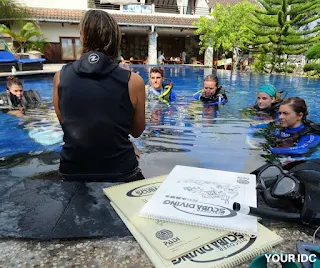Teaching Philosophy of PADI Course Director Sander Buis at Oceans 5 Gili Air
Introduction
Diving is not just a recreational activity; it's a journey into a different world, a venture into the deep blue where every bubble tells a story, and every dive leaves a mark on the diver. In this context, the role of a dive instructor is crucial. They are not just teaching diving skills but are also ambassadors of the ocean. This blog post delves into the teaching philosophy of PADI Course Director Sander Buis at Oceans 5 Gili Air, particularly during the PADI Career Development Course (IDC).
 |
| PADI IDC Gili Islands with PADI Course Director Sander |
Embracing Digital Transformation
Sander Buis stands out as one of the pioneers in integrating PADI Digital products into his teaching curriculum. This move towards digitalization reflects a deep understanding of the evolving nature of learning and the need to stay current with technological advancements. Digital learning tools not only make learning more accessible and efficient but also significantly reduce the environmental footprint of traditional, paper-based learning materials.
Pillars of Change: A Holistic Approach
PADI's three pillars of change form the backbone of Sander's teaching methodology. These pillars encompass ocean conservation, diver responsibility, and community engagement. Of particular interest is Pillar 2: Industry Sustainability. This pillar emphasizes the role of diving in economic sustainability and ecological responsibility. Sander's approach is aligned with PADI's vision of fostering a dive economy that is both responsible and beneficial to local communities.
Integration of Sustainability in Dive Training
At Oceans 5, sustainability is not just a buzzword but a core part of their philosophy. This is evident in their weekly beach clean-ups and collaboration with the University of Mataram for reef surveys. Moreover, all PADI Instructors at Oceans 5 are also Reef Check Instructors, which shows a commitment to environmental conservation.
During the IDC, Sander Buis takes a revolutionary approach by moving away from the traditional method of teaching in a kneeling position underwater. Instead, he advocates for teaching in a neutral buoyant position in open water. This method is not just about reducing the physical impact on the marine environment but also about setting a positive example for students. This approach ensures that the IDC candidates at Oceans 5 Gili Air are not just trained in diving skills but also in environmental awareness and best practices.
Real-World Application
Sander's teaching philosophy is grounded in real-world application. He ensures that his instructors are not just trained for the PADI Instructor Examination but for real-life teaching scenarios. This involves a comprehensive understanding of diving techniques, safety protocols, and environmental considerations. The goal is to create instructors who are ready to face the challenges of the diving world and act as responsible stewards of the marine environment.
Conclusion
In summary, Sander Buis's teaching philosophy at Oceans 5 Gili Air is a blend of digital innovation, environmental responsibility, and real-world applicability. His approach to dive instruction is not just about imparting skills but about nurturing a deep respect for the ocean and its inhabitants. By training instructors who are environmentally conscious and technically proficient, Sander is contributing to a more sustainable and responsible diving community. This philosophy is not just commendable but necessary in today's world, where the balance between enjoying nature and preserving it is more crucial than ever.


Comments
Post a Comment